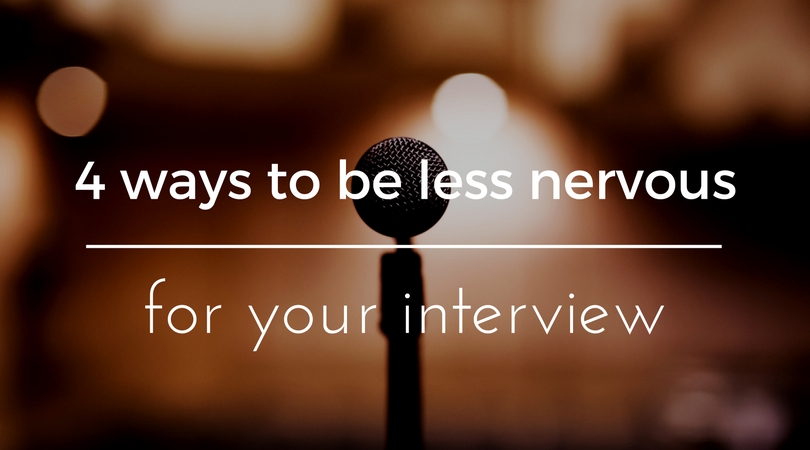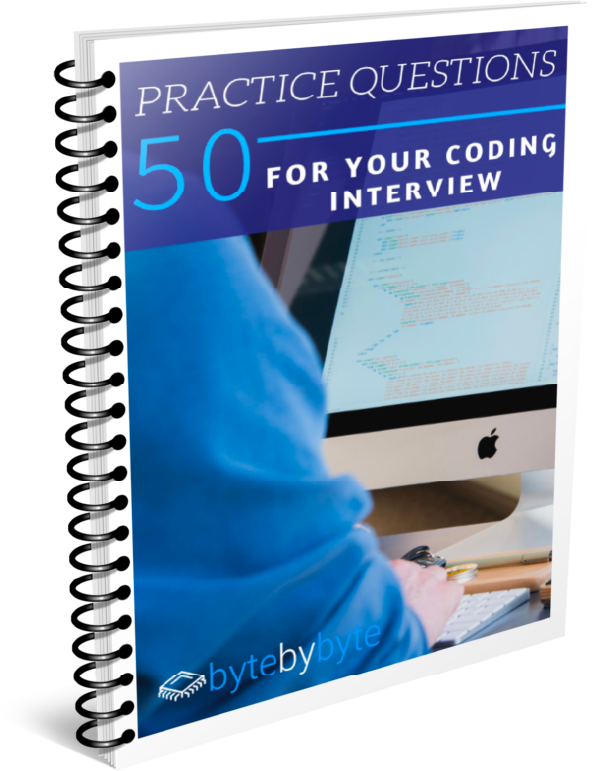
Maybe you’ve had this experience: You go into your interview. You’ve spent all this time studying, but you’re still really nervous. You know what you have to do, but once you get in the room, your mind goes completely blank. You completely bomb the interview because you’re so nervous.
If so, you’re not alone. Fear of public speaking is one of the most common fears in United States, and even though you’re only speaking with one or two interviewers, the same concepts apply.
You don’t want to make a fool of yourself. You’re smart, so you want your interviewer to see that. Maybe your friend referred you for this interview and you don’t want to let them down. Maybe this is your dream company. Maybe this is your last chance to get a job before you graduate college.
Whatever the reason, you’re justified in being nervous for your interview. There’s a lot of pressure to do well, both internally and externally.
This pressure is why it’s so important that we plan ahead about how we’ll deal with our nerves. Take a look at the different strategies in this post. While not all of these will work for everyone, I highly recommend you try them out. You may be surprised.
Reframe your relationship with your interviewer
There’s a quote from George Clooney that I absolutely love. It applies equally well here and in salary negotiations.
''I had to stop going to auditions thinking, ‘Oh, I hope they like me.’ I had to go in thinking I was the answer to their problem.'' - George Clooney Click To TweetYour interview is like an audition. The problem your interviewer has is that they need someone great to hire. Why not focus on showing them why they should hire you rather than worry about them finding a reason they shouldn’t?
Companies spend a ton of money and resources on hiring. It can cost anywhere from $10k to $30k to hire a single engineer. That’s a lot of money, particularly when you consider how many engineers a tech company will need to hire.
If they’re spending that much on recruiting, your interviewer doesn’t want you to fail the interview. On the contrary, hiring you would save the company a ton of money (and put a fat check in your recruiter’s pocket).
Once a company hires you, they no longer need to fill that position. They no longer have to hold off on doing project X because they simply don’t have the people to do it. Once they hire you, they get everything that you have to offer.
Because of this, your interviewer isn’t trying to make you fail your interview. Your recruiter isn’t out to get you. Rather, everyone at the company simply wants to know if you are really the answer to their problem. If you are, then there’s no reason to be nervous.
Practice, practice, practice
When I was in high school, like so many people, I had to take the SAT. My parents being the overbearing loving parents that they are decided that I should enroll in an SAT prep course so that I would get the best possible score.
In the end it was helpful, but particularly for one reason: I went into my exam knowing the SAT like the back of my hand.
The prep course lasted for 6 weeks and we did a practice exam every week. I learned exactly what sections there were on the exam, what kinds of questions would be asked, and even the order to expect each section. As a result, when I took the actual SAT, I didn’t need to think about it. I didn’t even read the instructions for any of the sections, saving myself a critical 30 seconds. When one of the timers for the exam cut us off a minute short, I knew and was angry, because I was so tuned in to the exam.
While there’s a lot more variance between different coding interviews than there is on the SAT, similar principles apply. If you know exactly what to expect, it will take away much of your anxiety and help you to perform way better in your interview.
Practicing will give you the confidence to know that you can succeed in your interview. If you’ve successfully answered 100 different interview questions, it will greatly build your confidence in your ability to answer any other questions that might come your way.
Here are a couple of ways to practice and get comfortable for your interview:
- Mock interviews
This is probably the most obvious solution, and one of the easiest/most effective. By doing mock interviews, you can get the experience of being in an interview without the same stakes. Just having someone there watching you really ups the pressure and mimics the real experience. If you’re looking for someone to do mock interviews with, I offer mock interviews. - Schedule your less important interviews first
This is sort of like doing mock interviews but on steroids. Rather than doing mock interviews, you get the practice you need by doing real interviews. The stakes are obviously a lot higher here, but if you plan on doing many interviews, you can schedule those with companies you are less excited about first so that you can get practice before your Google interview. A note here, though, is that companies spend a lot of money and engineering hours to interview people so be respectful and don’t interview at companies you have zero interest in working for. - Toastmasters
While this isn’t directly practice for interviewing, Toastmasters is an international organization that helps people improve at public speaking. Much of the anxiety that people experience during interviews is really performance anxiety. This directly overlaps with the fear of public speaking, so boning up on your public speaking skills is a great way to feel more confident during your interview.
Have a system
If you’ve been reading my material for any length of time, then this concept is hopefully starting to sound familiar. However, I’m going to beat this dead horse a couple more times because I really think it is that important.
When I talk to people about interviewing in general, I hear lots of different things and see lots of different approaches to trying to achieve the same end goal. There are the memorizers, who try to memorize the solutions to as many problems as they can. There are the studiers, who focus on theory and concepts. There are the practicers, who spend all their time doing mock interviews.
Ultimately, though, everyone’s work boils down to one fear: What if they ask me a problem in my interview that I don’t know how to answer?
This is the fear that causes the most nerves and the most unease going into an interview. This is what determines the direction of the interviewer after you finally know what question they’re asking you. Either a huge weight is lifted off your shoulders because you see the solution, or a ton of bricks drops on your head when you realize you have no idea what to do.
While there’s no perfect solution here, the best thing to do to get around this is to have a system.
A system gives you a series of steps to follow every time you go into an interview. It tells you what to do when you get stuck and how to ensure that you always continue making progress.
To learn more about my system for solving any interview question, check out this blog post.
Act confident
It is a psychologically studied fact that your actions can affect your emotions. Let me show you how this works. Try following these steps:
- Find a quiet place where no one will think you’re a crazy person
- Force yourself to laugh as genuinely as you can for 30 seconds
- Notice how you feel after 30 seconds of laughing
You’ll likely discover that even if you weren’t laughing before you started this exercise, it can be difficult to stop laughing afterwards. You literally change your emotional state by forcing yourself to laugh, even if you know intellectually that there is nothing funny.
You can use this exact same concept to help feel less nervous and more confident during interviews. In college, I used to perform concerts regularly with my singing group. I tend to get pretty bad stage fright, but I found this technique to be the single most effective way for me to overcome that fear. I’d simply go on stage and pretend that I wasn’t nervous.
Applying this technique in your interview is simple. As simple as simply going in and pretending to be confident even when you’re not. The idea here is not to trick your interviewer – they’ll expect you to be nervous – but to trick your brain. If you can trick your brain into thinking you’re confident, you will perform much better.
Nervousness during interviews is normal, and can actually be a good thing. If you can channel your nervous energy, it is possible to actually perform better than in practice.
However, we often let this nervous energy overwhelm us. When it takes control of us, we can no longer think or perform effectively. That’s why it is so important for us to have techniques to manage our nerves.
If you struggle with nervousness, try out the techniques in the post. You don’t have to do everything at once, but you will likely find that applying even one of these techniques will make a big difference. So channel your nerves and bask in your interview success.



